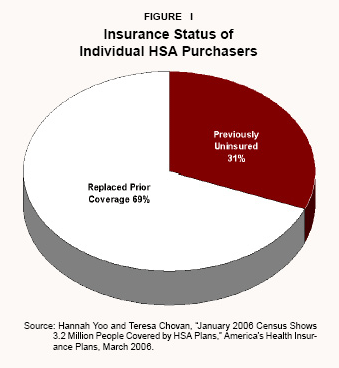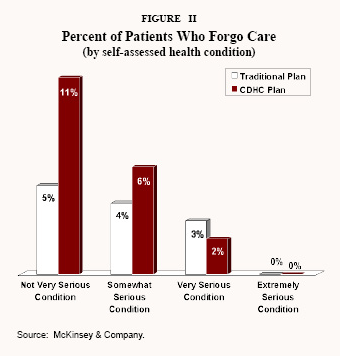Consumer-driven health care (CDHC) allows patients to manage some of the dollars they spend on health care. Health Savings Accounts (HSAs) are a mechanism for them to do so. HSAs are personal health accounts individuals own and control. Critics of HSAs have a litany of complaints. Many are essentially the same complaints CDHC critics made a decade ago, but some new ones have been added.
What follows are some answers.
Criticism: HSAs are a way for employers to shift costs to employees. Reply: HSA plans are really about shifting choice and control to employees by allowing them to manage more of their own health care. Health coverage through an employer is not something workers get for free. Economists generally agree that workers bear the full cost of employer-sponsored health plans through lower wages. Further, employers have no obligation to provide fringe benefits. Those who provide health insurance are free to cease doing so and to pay higher wages instead. HSAs do not in any way interfere with the employer's ability to make such decisions.

Criticism: HSAs won't help reduce the number of uninsured. Reply: HSAs have already reduced the number of uninsured Americans. America 's Health Insurance Plans, a trade group for health insurers, reports that about one-third of people who individually purchased HSA plans were previously uninsured. [See Figure I.] This is consistent with reports from Assurant and eHealthInsurance, which found that about half of those with incomes under $35,000 had not had coverage for at least six months prior to enrollment.
Criticism: HSAs will not improve efficiency. Reply: There is enormous waste in our health care system. Any patient can probably point to dozens of examples of inefficiency. However, because most health care is paid for by third parties (employers, insurers and governments), patients have no financial incentive to use health care wisely. HSAs allow patients to benefit from wiser use of health care, since the money they save is their own.
Lumenos found that when its CDHC plan replaced traditional health plans, there was an 18 percent reduction in outpatient visits. The rate of generic drug substitution for more expensive brand-name drugs rose to 92 percent, and total pharmacy costs fell 15 percent. Aetna found that, compared with individuals in traditional plans, CDHC enrollees reduced outpatient visits by 14 percent, primary care office visits by 11 percent, hospital admissions by 5 percent and emergency room visits by 3 percent.
NCPA research from South Africa found people enrolled in MSAs spent about 47 percent less on discretionary medical care than those in plans with no cost-sharing. A separate study of prescription drugs in MSA plans in South Africa found health account holders on average pay 11 percent less for nonchronic prescription drugs than those with traditional insurance because health accounts encourage patients to shop and control costs.

Criticism: Unsophisticated patients can't make wise decisions about medical matters. Reply: Thanks to the Internet and health care entrepreneurs, patients today have access to a tremendous amount of medical information from an estimated 20,000 health-related Web sites. About 80 percent of adult Internet users (estimated at 93 million people) have searched for health information online. According to a recent survey of patients visiting an internal medicine practice, more than half (54 percent) had used the Internet to gather health information. Of these, about six-in-ten (59 percent) rated the information "the same as" or "better than" information they got from their doctors.
HSAs allow patients to make crucial choices between health care and other uses of money. For example, people in need of arthritic pain relief will find that brand-name drugs cost about $800 more than over-the-counter ibuprofen over the course of a year. Is the extra relief from the brand-name drug worth the extra cost (and possible increased health risks)? No one but the patient can make that kind of decision.
Criticism: People with HSAs will skimp on needed health care. Reply: There is little evidence that they do. A joint study by the Employee Benefits Research Institute and Commonwealth Fund purportedly found that people with higher deductibles are twice as likely to delay or avoid care as those with comprehensive plans. But this is precisely what we should expect of people who are spending money out of pocket rather than someone else's money. A survey by McKinsey & Company found that people with extremely serious health conditions did not forgo care, whether covered by CDHC or traditional health plans. Those with very serious health conditions were more likely to forgo care if they had a traditional health plan compared with those in CDHC plans. Those with CDHC plans were more likely to forgo care than those in traditional plans for conditions they considered not very serious or only somewhat serious. [See Figure II.]
Reducing one's health consumption for less serious conditions is not injurious to one's health. A series of health insurance experiments conducted by the RAND Corporation in the 1970s found that people who paid a significant share of their health expenses consume about 30 percent less health care with little effect on their health.
When people manage their own health dollars, they cut down on unnecessary doctor visits, reduce unnecessary purchases of drugs and switch from brand-name drugs to less-expensive generic drugs. In short, people make all kinds of common-sense adjustments when they get to enjoy the rewards from more efficient purchase of medical care. In South Africa, where HSAs have flourished for over a decade, there is no evidence that HSA owners' long-run health costs are higher – which one would expect if they delayed early interventions that prevent costly complications – compared to people with traditional insurance.
Criticism: Consumers purchasing their own health care won't get the discounts obtained by large corporate buyers of care. Reply: According to America 's Health Insurance Plans, 90 percent of HSA plans are Physician Provider Organization (PPO) plans. As a result, patients get the same negotiated discounts they would get under managed care. Even when they go outside of the network, patients spending their own money often pay low prices – because doctors are willing to give discounts to avoid the cost of dealing with bureaucracies.
John C. Goodman is president and Devon Herrick is a senior fellow of the National Center for Policy Analysis.